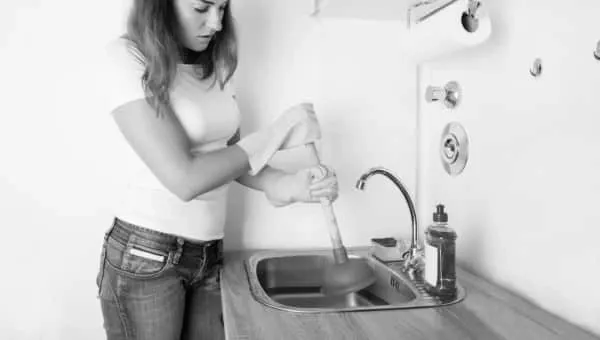Owning a new home can be a rewarding experience, but it comes with its share of responsibilities and challenges. One of those challenges might include having to deal with a clogged drain. This could be daunting if you’re unfamiliar with plumbing systems and need guidance on how to handle the situation.
Enter drain cleaners – they are a quick and easy way to unclog drains, making them a handy tool to have at your disposal. This guide will walk you through the world of drain cleaners and help you choose the best one for your needs.
Table of Contents
The Importance of a Quality Drain Cleaner
Keeping your drainage system in top shape is critical in maintaining the comfort and hygiene of your home, and an integral part of that is investing in the best drain cleaner. The impact of a blocked drain can be far more than a mere inconvenience, potentially leading to unpleasant odors, slow drainage, or worse, flooding and subsequent water damage. These issues not only disrupt your day-to-day activities but also pose a risk to the structural integrity of your home.
Having a high-grade drain cleaner at your disposal can help nip these problems in the bud. Not only can it effectively clear minor clogs, but it can also prevent them from escalating into more serious issues. This preventive measure can save you a significant amount of money in the long run, as neglecting a clogged drain can necessitate expensive repair work down the line.
However, it’s important to note that not all drain cleaners are created equal. The effectiveness of a drain cleaner largely depends on its formulation and the nature of the clog it’s designed to combat. Therefore, choosing the right one for your needs is crucial. In the following sections, we will discuss the different types of drain cleaners and provide guidance on selecting the best one for your needs.
Remember, a quality drain cleaner is more than just a handy tool—it’s an investment in the longevity of your home’s plumbing system and your peace of mind. With a reliable drain cleaner, you can confidently face any minor drain issues, knowing that you have the means to address them quickly and effectively.
Types of Drain Cleaners
The best drain cleaners primarily fall into three categories, each having its unique method of tackling clogs. The first type is chemical cleaners, which are known for their strength. These cleaners function by inducing a potent reaction that disintegrates the obstructive material within the drain. While effective, they are not a green solution and their frequent use may result in pipe damage due to their harsh composition.
The second category is enzymatic cleaners. These are bio-based solutions that use natural enzymes or bacteria to break down the clog. Unlike their chemical counterparts, enzymatic cleaners are environmentally friendly and gentler on your pipes. They work best on organic material like hair and food waste, making them an ideal choice for kitchen and bathroom drains. However, they work slower than chemical cleaners and may not be the best option for severe clogs.
Lastly, we have mechanical cleaners, which are physical tools used to clear blockages. The most common of these is the plumber’s snake, a flexible sink auger that you can manually push into the drain to break apart the clog. Another popular mechanical cleaner is the drain rod, which is useful for reaching deeper clogs. Mechanical cleaners can be highly effective and don’t carry the risk of pipe damage or environmental harm. However, they do require a bit more effort to use compared to pouring a liquid cleaner down the drain.
Each type of drain cleaner has its strengths and potential drawbacks. In choosing the right one, you need to consider the nature and severity of the clog, as well as your personal preferences and environmental concerns. In the next section, we will delve deeper into how to make that choice, ensuring that you are equipped with the most suitable tool for maintaining your home’s drainage system.

Choosing the Best Drain Cleaner
Selecting the best drain cleaner for your needs should be a careful process, considering a number of factors. These include the nature and intensity of the blockage, the type of plumbing in your home, and your own comfort level with using different products.
For instance, if you’re dealing with a minor clog caused by food debris or hair, an enzymatic cleaner may be an excellent choice. These cleaners are eco-friendly and mild on your pipes, making them suitable for frequent usage. On the other hand, for more stubborn clogs, you might need the powerful action of a chemical cleaner. However, these should be used sparingly due to their potential to cause pipe damage over time.
If you’re comfortable using physical tools and wish to avoid chemicals, a mechanical cleaner like a plumber’s snake or a drain rod could be your best bet. These tools can effectively break apart obstructions without the need for any chemicals. However, they require more effort to use and may not be suitable for everyone.
It’s also important to consider the material of your pipes. Older metal pipes may not withstand the corrosive nature of chemical cleaners, whereas newer PVC pipes are more resistant. Always check the product label to ensure the cleaner is safe to use with your type of plumbing.
Lastly, consider your comfort level in handling these cleaners. If you’re not comfortable using a plumber’s snake or dealing with harsh chemicals, you might prefer a gentler, easy-to-use enzymatic cleaner.
Bear in mind that while drain cleaners can resolve many clogs, they are not a cure-all solution. Persistent or recurring blockages may indicate a more serious issue that necessitates a professional plumber’s expertise. Always prioritize the health of your plumbing system over quick fixes, and don’t hesitate to seek professional help when needed.
How to Use a Drain Cleaner
Applying a drain cleaner can vary depending on the kind of product you choose. If you have decided on a chemical or enzymatic cleaner, the usual method is by pouring the solution directly into the drain. After application, it’s recommended to leave the product to work for a period of time specified by the manufacturer. This is generally to allow for the cleaner to break down the clog effectively. Once this waiting period is over, flush the drain with water to rinse away the disintegrated material.
For a mechanical cleaner, such as a plumber’s snake or drain rod, the process is more hands-on. Insert the tool into the drain and maneuver it to reach the clog. Use the tool to break up the blockage and then remove it from the drain. It’s advisable to follow any instructions provided with the tool to ensure you use it safely and effectively.
Regardless of the type of cleaner, always prioritize safety. This might include wearing protective gloves or goggles, ensuring good ventilation if using a chemical cleaner, and avoiding any physical contact with the product. Furthermore, always adhere strictly to the manufacturer’s guidelines to get optimal results and prevent any potential damage to your drainage system.
Remember, while drain cleaners can effectively handle minor clogs, they may not always be the solution for persistent or recurring blockages. In such cases, it might be wise to enlist the help of a professional plumber to diagnose and treat the problem. Therefore, don’t hesitate to seek professional assistance when necessary, to maintain the health and longevity of your home’s plumbing system.
When to Call a Professional Plumber
While drain cleaners can be a beneficial first step in addressing clogs, they aren’t a panacea for all drain issues. If you’ve attempted to clear a clog with a drain cleaner without success, or if you’re noticing a pattern of recurring clogs, it’s likely time to contact a professional plumber. Persistent or repetitive blockages could be indicative of a more serious underlying issue such as a damaged pipe or an intrusion of tree roots, both of which necessitate professional intervention.
Plumbers possess the skills, experience, and tools to accurately diagnose and address plumbing issues that go beyond simple clogs. They can carry out thorough inspections, identify the root cause of the problem, and recommend the most effective and long-term solutions. They can also provide preventative maintenance tips and advice to help you avoid similar problems in the future.
It’s crucial to note that delaying professional intervention in the case of severe blockages could result in more extensive and expensive damage over time. Issues like pipe damage, root intrusion, or serious clogs could worsen over time, leading to potential flooding, water damage, and costly repairs.
To ensure the health and longevity of your home’s plumbing system, always prioritize proper professional intervention over quick fixes, especially for persistent or recurring issues. By doing so, you’re not only resolving the current problem but also preventing future ones. Remember, your comfort and peace of mind are paramount, and in situations that exceed your expertise or comfort level, it’s always best to seek out a professional plumber’s help.
FAQs
What do plumbers recommend to keep drains clean?
Simply pouring hot water down your kitchen and bathroom sink drains once a week can go a long way. For the kitchen sink, hot water will help melt and flush away light grease deposits. Bathroom drains benefit from very hot water because it can remove excess residue and gunk.
Does pouring vinegar down the drain unclog it?
Pour about 1 cup of vinegar down your drain and let it sit for 30-40 minutes. Vinegar has a very high acid content (which is why it’s great on soap scum) and it will break down a good bit of the organic content that is stuck.
What do professionals use to unblock drains?
Drain augers, also referred to as drain snakes, are several types of tools that plumbers typically carry with them consistently. Essentially, an auger is a fundamental implement that is particularly effective for stubborn drain blockages that are difficult to dislodge, as well as for the purpose of drain cleaning.
